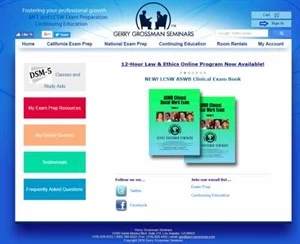 Gerry Grossman is the founder of Gerry Grossman Seminars, one of the small handful of well-respected exam-prep companies. He talked to SWTP via email about how he came to be who he is and what the company offers.
Gerry Grossman is the founder of Gerry Grossman Seminars, one of the small handful of well-respected exam-prep companies. He talked to SWTP via email about how he came to be who he is and what the company offers.
What's your background? What do you do now?
I am a Marriage Family Therapist and have been licensed for 25 years. My clinical training primarily focused on working with families and young children. For a number of years as an intern and then as a newly licensed therapist, I worked in a therapeutic pre-school with children who were severely emotionally disturbed or had significant behavioral issues. For the past 26 years, I've been conducting an enrichment group at various pre-schools in which I advanced emotional literacy by talking about various feeling states. Children draw pictures of themselves, their families and depict stories that address the feelings that we are discussing. I'm also a trained hypnotherapist and have hypnotized thousands of people, primarily as it relates to the examination process.
When I was preparing for my MFT exam, I was dissatisfied with the nature of the examination services available to me at that time and felt that I could do a better job in meeting the individual needs of students in a more related way that when was offered to me. Over the past 25 years, Gerry Grossman Seminars has trained thousands of therapists for their licensing exams and we provide licensees with live CE presentations as well as educational materials that can be purchased for independent study. We started training LCSW candidates for their licensing exams eight years ago. Historically, LCSW examinees have not had a high passing rate on their exams. In particular, I remember going to a BBS meeting and it was stated that only 32% of LCSW written candidates had passed their exam that round. LCSW candidates were coming to us out of their frustration and because their MFT colleagues were very satisfied with the services we provide. Initially, I began to tutor LCSWs for their licensing exam. I was struck by the significant overlap between the exams as well as some of the differences. It was my firm belief that if LCSW candidates utilized the comprehensive methodology that is characteristic of our training that they would too pass their exams at the same high rates as our MFT candidates. This has proven to be the case as we have over a 90% passing rate with our LCSW candidates during the last round of the examinations June 1-November 30, 2009. Currently, we offer a 21 hour LCSW-specific course for Standard Written Exam and a 22 hour LCSW-specific Clinical Vignette Exam. These classes are being offered in Los Angeles, Burlingame, and San Clemente.
We've worked very diligently in developing our LCSW specific material: We have a book on Biopsychosocial Assessment, as well as a book on Resource Coordination. Additionally we have audio presentations on both these topics. We have LCSW-specific law and ethic flash cards. A very important component of our program is the experiential learning that occurs on our test banks. We have LCSW-specific test banks for both the Standard Written and Clinical Vignette exams. Currently we have 6 complete practice exams online for the Written test bank and 8 complete practice exams for the Clinical Vignette. For the Standard Written Exam, treatment planning and treatment represents 51% of the exam and we are well positioned with the materials we provide. We have theory flash cards, a theoretical comparison chart, audio presentations on Object Relations, Bowen, Experiential, Structural, Cognitive Behavioral, Strategic, Gestalt, Solution Focused and Narrative.
How do you go about writing sample questions? How do you keep tabs on the real exam as it changes over time?
We base our curriculum on the LCSW Standard Written and Clinical Vignette Candidate Handbooks. In a very thorough and methodical manner, we have gone through every item that is in these documents and first created education materials that reflect each behavioral anchor and then once we have developed the materials, base questions off of them. I was heartened by one candidate who called up during his studying process and realized that the progression of our biopsychosocial book mirrored the sequence of the BBS knowledge statements. Although specific exam questions change in each six month period, the objectives of the exam and the percentage emphasis that the exam is testing for remains the same. The exam significantly changes when there is a new occupational analysis a process that occurs between every 5 and 7 years.
A last question: How do you expect the DSM-V rollout will affect the exam--will the BBS rework all its test questions immediately...will GGS?
In the past, when the DSM-III-R was changed to the DSM-IV, it took the BBS a considerable amount of time to implement new questions. So I would predict that the change won't be immediate. Also, please keep in mind that the DSM-V is scheduled to be released in 2013, so we've got lots of time to do other things.
Find Gerry Grossman Seminars on the web: GerryGrossman.com.
March 8, 2010
Categories :

 Gerry Grossman is the founder of
Gerry Grossman is the founder of